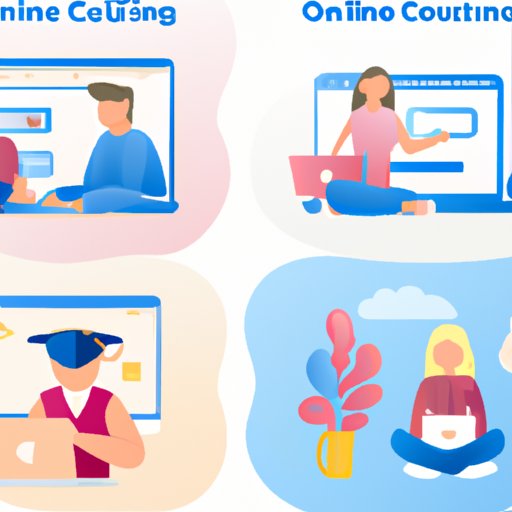Introduction
Online college is a growing trend in higher education. It allows students to access high-quality educational opportunities from the comfort of their own homes. But what is online college, and how does it work? This article will explore the advantages and disadvantages of taking online college classes, provide tips for succeeding in an online college course, and look at what to expect from an online college experience.

Exploring the Pros and Cons of Taking Online College Classes
When considering whether to pursue an online college degree, it is important to understand the pros and cons of this type of education. Here are some of the major advantages and disadvantages to consider.
Advantages of Pursuing an Online College Degree
The main advantage of taking online college classes is convenience. Students can access courses from anywhere in the world, at any time of day. This makes it possible for students who may have other commitments, such as jobs or family responsibilities, to pursue their educational goals. Additionally, online courses often cost less than traditional on-campus courses, making them more affordable for many students.
Disadvantages of Taking Online College Classes
While there are many advantages to taking online college classes, there are also some drawbacks to consider. For one, online courses require good discipline and self-motivation. Without the structure of a traditional classroom setting, it can be difficult for some students to stay on track and complete their coursework in a timely manner. Additionally, online courses may not offer the same level of student support that is available in a traditional classroom setting.
Tips for Succeeding in an Online College Course
For students who decide to take online college classes, there are several steps they can take to ensure success. Here are some tips for succeeding in an online college course:
Time Management
Time management is key to succeeding in an online college class. Students should create a schedule for completing all course assignments and stick to it. Additionally, students should set aside time each week for studying and participating in online discussion boards.
Study Strategies
Developing effective study strategies is essential for succeeding in an online college course. Students should take notes while reading course materials, review those notes regularly, and create flashcards or other study aids to help them remember key concepts. Additionally, students should take advantage of virtual study groups, if available, and reach out to the professor if they need extra help.
Access to Resources and Support
Students should take advantage of all the resources and support available to them in an online college course. This includes virtual tutoring services, academic advisors, and library resources. Additionally, many colleges offer online counseling services, which can be helpful for students who are struggling with the transition to online learning.

What to Expect from an Online College Experience
Before enrolling in an online college course, it is important to understand what to expect from the online learning experience. Here is a look at some of the key aspects of an online college experience:
Learning Environment
When taking an online course, students will typically access course materials through a web-based platform. This platform may include lecture videos, readings, discussion boards, and virtual office hours with the professor. Additionally, many online courses use interactive tools, such as simulations and games, to engage students in the learning process.
Course Delivery
Most online college courses are delivered through asynchronous instruction, which means that students can access the course material at any time. However, some courses may also incorporate synchronous components, such as live lectures or video conferencing sessions.
Interaction with Professors and Peers
In an online college course, students will typically interact with their professors and peers through email, discussion boards, and other digital tools. While these interactions may not be as frequent or as in-depth as in a traditional classroom setting, they can still be beneficial for fostering a sense of community among students.
Conclusion
Taking online college classes can be a great way to pursue a higher education from the comfort of home. But it is important to understand the benefits and challenges of this type of education before enrolling in an online course. Students should consider the advantages and disadvantages of taking online college classes, develop effective study strategies, take advantage of all available resources and support, and understand what to expect from the online learning experience. With the right preparation and dedication, students can succeed in an online college course.
(Note: Is this article not meeting your expectations? Do you have knowledge or insights to share? Unlock new opportunities and expand your reach by joining our authors team. Click Registration to join us and share your expertise with our readers.)
